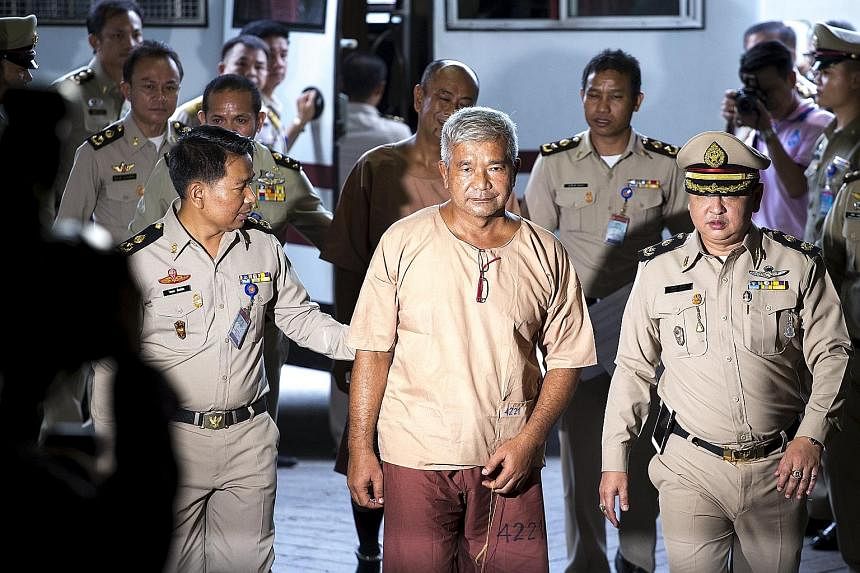Six months after mass graves were discovered on the Thai-Malaysian border, 88 human trafficking suspects appeared shackled in a packed Bangkok courtroom yesterday to hear a panel of seven judges detail the charges they face.
The case, which implicates a three-star general as well as an influential businessman from southern Thailand, is expected to take more than a year to conclude.
Intimidation of witnesses had prompted the authorities to move the hearing of the case from southern Thailand to the capital. Migrant activists fear the list of more than 400 witnesses may be whittled down by bribes or continued threats to their safety.
Yesterday, the most high-profile defendant, Lieutenant-General Manas Kongpan, was impassive as he was led in alongside other suspects in brown prison garb, his wrists and ankles in chains. He is accused of being a linchpin but has maintained his innocence.
His lawyer Noppachai Veratanya told reporters: "Everything will be proven in court. We have all the documents filed and ready."
At least four other military officers are accused of complicity in human trafficking, as are police officers and the former chairman of Satun provincial administration organisation, Pajjuban Angchotephan.
The trial will begin after the examination of witnesses and evidence this week. Also in court was lead police investigator Paween Pongsirin, who quit his post last Saturday, saying a transfer order to Thailand's southern border provinces would expose him to risk of a revenge killing by trafficking gangs.
In an interview with The Straits Times on Sunday, he had also lamented the lack of support for his team's work, and said many human traffickers were still conducting their "business as usual".
Yesterday, he told reporters: "I feel really sad. I still want to be a policeman; I believe I can still contribute to society."
Thailand is languishing in the bottom tier of the United States' annual Trafficking in Persons report.
Porous borders and easy travel connections make Thailand a regular transit point for human smugglers and traffickers, but it was a regional migration crisis in May involving Rohingya Muslims from Myanmar and Bangladeshis that focused global attention on the clandestine networks fuelling the multi-million-dollar trade.
Every year, thousands of these migrants and asylum seekers board smugglers' boats headed for Malaysia where they can find work. But they often fall prey to traffickers and are held for ransom in remote border jungle camps.
After the discovery of mass graves on Thailand's side of the Thai-Malaysian border, Malaysian officials also uncovered similar graves.
The subsequent Thai crackdown forced traffickers to abandon their human cargo at sea, and created a humanitarian crisis after the Malaysian, Indonesian and Thai governments initially repelled the packed boats.
In late May, Malaysia and Indonesia agreed to give the migrants temporary shelter, allowing more than 2,000 of them ashore.
Researchers say they are now seeing fewer signs of migrant boat departures but Bangkok-based Rohingya activist Abdul Kalam suggests the traffickers could be just lying low in neighbouring countries like Malaysia and Myanmar amid the official scrutiny.
"It is not finished," he told The Straits Times.


